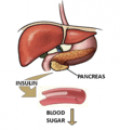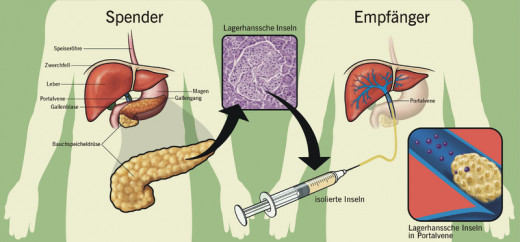Diagram Showing How Insulin is Normally Released from the Pancreas

When your pancreas stops working, your body will no longer be able to produce the insulin that it needs. This means that it will no longer have the means to regulate your blood sugar level. Normally, a person who eats foods that contain carbohydrates will digest the food and have the carbohydrates changed to glucose and other nutrients.
What happens when your pancreas stops working and cannot produce insulin? What will happen when you have a meal for breakfast, lunch or dinner that consists in part of carbohydrates? Your body will definitely be flooded with too much glucose and that can cause damage to your internal organs. If your pancreas isn't working, you'll need to get insulin from another source so that the correct blood sugar levels can be maintained in your body.
Dual Roles of the Pancreas
Pancreas Treatment For Diabetes- Pancreatic Islet Cell Implants
People who have trouble controlling their blood glucose level will soon be able to cope with their illness better through a diabetes cell implant treatment. A diabetes patient who uses insulin to keep their blood sugar level in check can speak to their doctor about this revolutionary new method of treatment.
Exercises for Diabetes Prevention
Diabetes cell implant treatment employs cells from the pancreas. Since the treatment for relies on pancreatic cells, it mirrors the operation of the organ in which those cells would normally be found.
Physicians hope that people with Type 1 diabetes will be better able to monitor their illness if they receive the cell implants. In Type 1 diabetes, individuals have a problem controlling their blood glucose level.
Normally, a person who eats foods that contain carbohydrates will digest the food and have the carbohydrates changed to glucose and other nutrients. Excess glucose is stored in another form so that it does not affect the routine operations of the body. However in a person with Type 1 diabetes, enough insulin is not present in the body and that allows the amount of sugar in the blood to get out of control.
People with Type 1 diabetes have symptoms such as weight loss. They are often excessively thirsty even though they might drink more water than the average person in the attempt to ease their thirst. They also urinate frequently. A diabetic person who for some reason, emergency or otherwise, has to urinate outdoors may notice that ants follow their urine.
The solution offered to most diabetic patients involves taking some form of insulin. This is usually delivered in tablet form or as an injection. Individuals with the illness are also required to control the amount of calories they consume each day. They cannot have an excessive amount of carbohydrates and usually must avoid sweets. This can be especially stressful on younger diabetics or individuals with a sweet tooth who would want to enjoy mangoes, chocolates, ice cream and cookies. Fortunately, there are ways to prepare many treats that make them safer for diabetics.
The Process of Clinical Islet Cell Transplantation

With the diabetes cell
implant treatment, surgeons place cells from the pancreas directly
underneath a patient’s skin. Usually, a diabetic would have to inject
insulin under the skin daily. Doctors hope that the pancreatic cells
would produce the required amount of insulin and eliminate the need for
patients to inject themselves with the hormone.
This method has already been tested successfully in mice. It would be of great benefit to human beings who for one reason or another, have trouble keeping pace with their required treatment. Some persons, especially persons who have a busy schedule or are forgetful, have trouble taking insulin. Others just don’t like needles.
This method has already been tested successfully in mice. It would be of great benefit to human beings who for one reason or another, have trouble keeping pace with their required treatment. Some persons, especially persons who have a busy schedule or are forgetful, have trouble taking insulin. Others just don’t like needles.
Related
Pancreatic diabetes
Artificial pancreas pump
Diabetes and the pancreas
What happens when your pancreas stops working?
Insulin pump implant
The pancreas and diabetes
Pancreas treatment for diabetes
Diabetes and pancreas